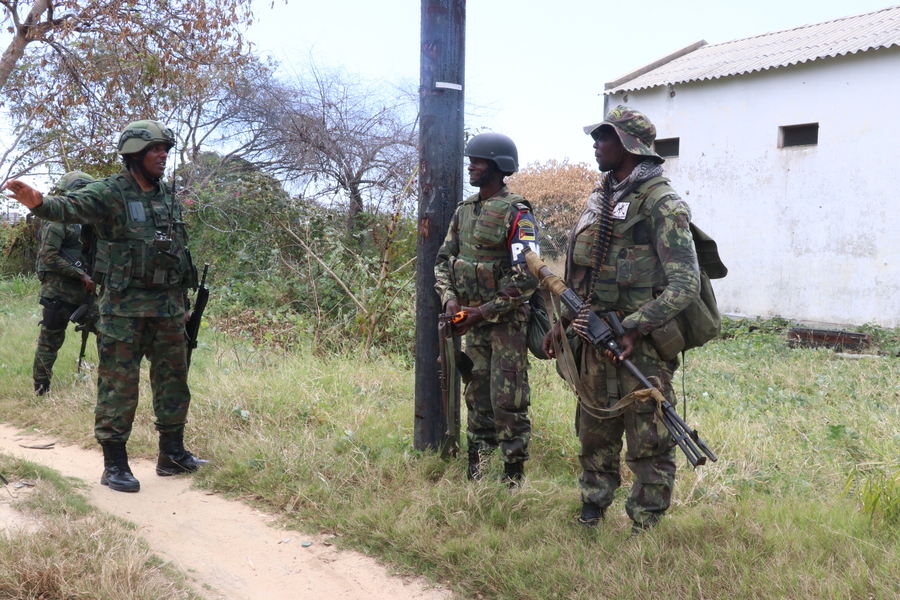

Rwandan and Mozambican forces on Sunday, August 8, captured Mocimboa da Praia, a Mozambican port city that had been the headquarters of the Islamic State-linked terrorist group in Cabo Delgado Province since 2015.
Days earlier, the host nation's forces advanced from the south of the city while their Rwandan allies moved in from the north and west. And they were moving in fast.
By all means, the capture of the port city deals a heavy blow to the insurgents who have driven around 826,000 people from their homes and killed more than 2,000 others, in the entire Province.
At the port's harbour, a senior Mozambican marine officer, Commander Oscar A. Lucas, told journalists that the victory was enormous for his country.
"It is an important victory because this is a very important strategic port city for Mozambique. And this city has also been a very important entry or supply point for the insurgents. This will be no more," said Lucas.
Mocimboa da Praia was the terrorists' stronghold in the Province. It had a big airport with a two-kilometre runway.
Its port is also very important because it connects the Province to other regions of the country and abroad.
For the terrorists, the city was a key connection to the outside world and a major logistics hub. By capturing it, the government will now ably deny the terrorists access to the sea, the airport, and support from outside.
The port city is also home to the Province's main power substation distributing electricity to five other neighbouring districts.
Reclaiming it implies the government can now revamp its heavily looted and ravaged infrastructure and pave way for development.
A Rwandan operations commander who led the onslaught on Mocimboa da Praia told journalists on Sunday afternoon that there was no fighting when they advanced about five kilometers from the city.
The joint forces moved in and captured the city at 8am in morning, without firing a shot.
"Once we got so close, about five kilometers, they took off," Brig Gen Pascal Muhizi said, adding: "There was no fighting in the city because the enemy fled before we got here."
In the past few days, the joint forces encircled the district from the north, south and west.
They gradually pushed back the insurgents, and then embarked on what is standard military procedure - securing captured zones and gathering information for the subsequent operation - before the final assault on Saturday.
On the main road to the city, about six kilometres from the city, The New Times counted four dead bodies of terrorists killed during fighting on Saturday.
Phase one of the battle is now generally, over, Muhizi noted, considering that the district, and especially the city, was the insurgents' headquarters "and we have routed them out."
Muhizi said: "The city is fully secured now. However, the war is not really over since the terrorists reorganised and ran away and are now still hiding in some small pockets in the region. The biggest achievement today is also the fact that we secured the key road connecting the northern and southern regions of the Province from here."
Commander Lucas said: "We have so many other inland districts and towns that Mocimboa da Praia facilitated the entry of goods to. The capture of this city is very important for entire Mozambique and the rest of the SADC countries, for regional trade."
Asked what next that the important city is now in government hands, after being held by the insurgents for six years, Commander Lucas said "we have to now secure the port and ensure that development happens in our country."
The New Times observed that in regions where the insurgents have been routed, the terrorists left behind ghost towns where people have fled. Just like in Palma which The New Times visited on Sunday morning, Mocimboa da Praia is also a ghost town.
Shops and other buildings were vandalised, and set on fire. Vehicles were burnt too and rebuilding will take some time but it can be done.
The Mozambican officer noted that he couldn't find words enough to thank the Rwandan government for its support in securing the city. By and large, Mozambique's military, along with their Rwandan allies, is gaining ground against the insurgency in Cabo Delgado.
A month ago, on July 9, the government of Rwanda, at the request of Maputo, deployed 1,000 troops to Cabo Delgado to help fight the terrorists, stabilise the area and restore the authority of the state.
Rwandan troops were sent to work closely with Mozambique Armed Defence Forces (FADM) and forces from SADC, in the fight against terrorism in Cabo Delgado.
In October 2017, armed extremists linked to the Islamic State of Iraq and the Levant (ISIL) launched an insurgency in Cabo Delgado. They launched attacks, and in August 2020 seized Mocimboa da Praia.
More than 50 people were beheaded by terrorists in the province in April 2020 and a similar number in November 2020. In September 2020, the ISIL insurgents captured Vamizi Island in the Indian Ocean.
On March 24, the militants seized Palma, murdering dozens of civilians displacing more than 35,000 of the town's 75,000 residents.


